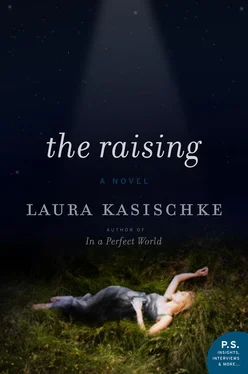“And, of course, these girls were so sweet. And so beautiful. Josie, and this other girl, Amanda Something. They could have been Denise. Their hair, and their clothes, and their ‘likes’ and ‘you knows’ and the little mannerisms, their pretty manicures. I thought, Okay, my daughter wore her grandmother’s earrings and her Winter Event dress and got on a bus, and—and what?
“And by the time these girls brought me her things, it had been six weeks already. Six unbearable, sleepless weeks. And then the summer was over and the police told me they were ‘working’ on the case.
“So I sat down at the computer and looked her up—Nicole Werner—mostly because her parents were the only parents on earth I could think of who had it worse than I did. Maybe there was some kind of perverse satisfaction in that. I read every word I could find about the accident, and the funeral, and the memorial service, and the sorority and their fucking cherry trees, and then I came across one very, very interesting item.
“I came upon a photograph of that pretty dark-haired girl who’d brought Denise’s belongings home. She’d been, it seemed, Nicole Werner’s roommate. And there she was in this photograph, standing at a lectern giving a little speech during the dedication of the cherry orchard, supposedly two weeks after my daughter disappeared, and that little fucking slut was wearing my goddamned Italian countess grandmother’s earrings. ”
Shelly saw it, herself, then—the Googled image—suddenly before her: Josie Reilly in a sweet, tiny, black dress, gripping the sides of a lectern with both hands, wearing sunglasses, a branch full of blossoms lit up behind her head, and the bright glinting blur of Ellen Graham’s grandmother’s earrings dangling from her ears.
Those earrings hadn’t even registered on Shelly until now. If she’d noticed them at all she’d have assumed they were some kind of costume jewelry, something Josie had bought at the mall—at Claire’s, or Daisy’s, one of those places where sorority girls love to stock up on baubles.
“It was September by then,” Ellen Graham went on, despite the shaking of not only her voice but her whole body, “and I called in my baby brother, who’s a bouncer at a bar in Ypsilanti—six feet tall and two hundred pounds of solid muscle—and we went straight to the Omega Theta Tau house and sacked the place. When we found them in her room, Josie Reilly pretended to be astonished that the earrings were my grandmother’s. She claimed Denise had given them to her, told her they were costume jewelry. When I pointed out that I hadn’t let Denise borrow them until just before she disappeared—well, it didn’t make any difference. Those girls have a story and they’re sticking to it. But I know for a fact that my daughter wasn’t gone before the Spring Event. She was there, and she wore her dress, and she wore those earrings. I just don’t know what happened after that.”
“What about her phone? Did the police check the cell phone records?” Shelly asked. “And her attendance in her classes?”
“She’d lost her cell phone the week before. One of the four. We were getting her another one. And the only class she had from Monday until Wednesday was a lecture with three hundred students in it. Her violin lesson had been canceled because the professor was sick. It’s a huge place, as you know. No one was keeping a record of where she was or wasn’t.
“And those sorority bitches. Those lying little bitches. Denise was a girl who was Twittering and Facebooking and texting all day, and so are those other girls. They’ve got messages flying from one end of town to the other twenty-four/seven. So if they had no idea where my daughter was, why wasn’t there one single message left on her Facebook page after the day she disappeared? How come I can’t find one single girl who posted a word on the Internet saying, Gosh, I haven’t see my sorority sister in six months, anyone know where she is? ”
The light in the closet was so bright that Shelly’s eyes had begun to tear. She put a hand to her forehead, like a visor. She looked at Ellen Graham, whose own eyes were so red-rimmed it appeared as if she’d lined them with lipstick.
She swallowed, and then asked, “What do you think, Ellen? What happened to your daughter?”
“You think we didn’t try to contact the newspaper? You think we didn’t make about a hundred trips to the police, to university security, to the administrators? I know the layout of the University Administration building like the back of my own hand. We hired a private detective. We tried to involve the FBI. We aren’t perfect, but our daughter had no reason to run away from us.”
Shelly believed her. Completely. Implicitly. Maybe Shelly had spent the last three decades of her life in academia, where no one really believed that anyone outside of it could actually be intelligent, but she knew otherwise. There was the hard, glittering force of pure intelligence in Ellen Graham’s eyes. She could be anywhere, doing anything. She was smarter than Shelly, smarter than all of them.
Ellen Graham put a hand to her own throat, and said, “I know what happened to Denise, but I don’t know why, and I can know it without accepting it. I knew it that night, the night of that Spring Event .” She spat the word event. “Somebody killed my daughter. Her dad and I were on a jet, on our way home from our vacation. It was the middle of the night. We were over the clouds. I was planning to call the sorority the second we touched down, to see how her special night had gone, but when I looked out the window, there she was, wearing her white dress and my grandmother’s earrings. She was kind of peering in at me, like she wondered if I could see her, and there were tears running down her face, and when I put my hand to the window it was burning hot, and then she was gone, and now I’ll never see my daughter alive again.”
There was no self-pity in it. No whining. Just finality, factual clarity. Denise, Shelly realized, would have grown up to be just like her mother: The mother the slacker teachers in the public school would hate to see coming. The woman on the school board who actually made things change. The kind of person who lived the good, fulfilling life, who paid the taxes that made it possible for so many of Shelly’s academic colleagues to spend their lives feeling superior. Denise Graham, like her mother, would have married intelligently, maybe stayed home with her children, seen to it that they ate a hearty breakfast every morning, been there to pick them up after school, to supervise their homework, to drive them to their music lessons. She’d have enjoyed her home, her town, her parents as they slid from vital presences into old age. She’d have been at their bedsides when they died.
Shelly had to will herself to hold Ellen Graham’s gaze, and then the only thing she could think to say was, “But, you’re still looking for her…”
Ellen Graham snorted, tossed her head like a horse with an uncomfortable bit in its mouth. “What else?” she said. “What else would you have me do now?”
Karess came out of the autopsy room looking bleached of color and flushed at the same time. She had her hair tucked up into the shower cap, and when she took the cap off her head, the hair came tumbling down around her shoulders.
She tossed the scrubs to Perry and then tossed the cap in his direction, too, although it landed at his feet. She kicked the booties off with some difficulty, stumbling backward and managing not to fall down only because Brett Barber was standing behind her. She slammed into him, and he caught her awkwardly under the arms. Karess shook her head and looked back at Brett, appearing more annoyed by his presence than grateful. She hurried past Perry, and he could smell her, both in the gown she’d tossed to him and in the breeze she left as she ran: Formaldehyde. Sweat. Shampoo. Powdered flowers.
Читать дальше












